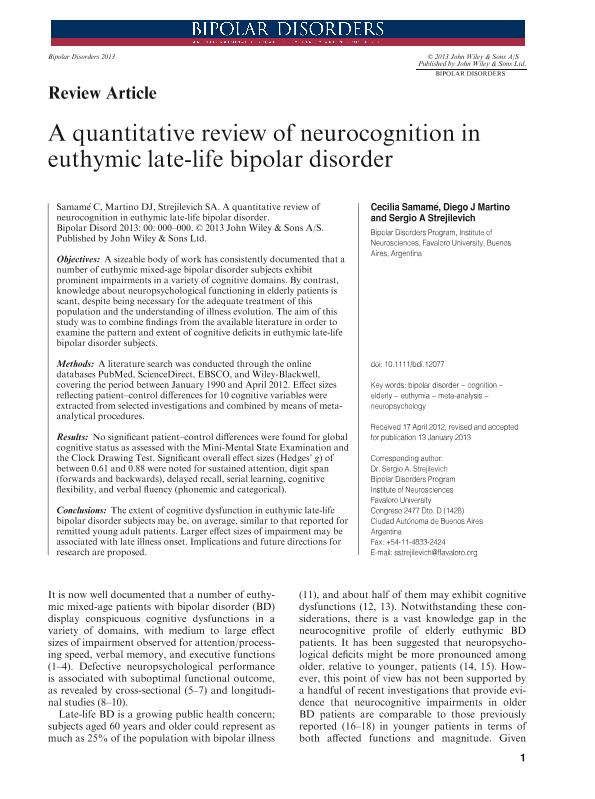Artículo
A quantitative review of neurocognition in euthymic late-life bipolar disorder
Fecha de publicación:
09/2013
Editorial:
Wiley
Revista:
Bipolar Disorders
ISSN:
1398-5647
e-ISSN:
1399-5618
Idioma:
Inglés
Tipo de recurso:
Artículo publicado
Clasificación temática:
Resumen
OBJECTIVES: A sizeable body of work has consistently documented that a number of euthymic mixed-age bipolar disorder subjects exhibit prominent impairments in a variety of cognitive domains. By contrast, knowledge about neuropsychological functioning in elderly patients is scant, despite being necessary for the adequate treatment of this population and the understanding of illness evolution. The aim of this study was to combine findings from the available literature in order to examine the pattern and extent of cognitive deficits in euthymic late-life bipolar disorder subjects. METHODS: A literature search was conducted through the online databases PubMed, ScienceDirect, EBSCO, and Wiley-Blackwell, covering the period between January 1990 and April 2012. Effect sizes reflecting patient-control differences for 10 cognitive variables were extracted from selected investigations and combined by means of meta-analytical procedures. RESULTS: No significant patient-control differences were found for global cognitive status as assessed with the Mini-Mental State Examination and the Clock Drawing Test. Significant overall effect sizes (Hedges' g) of between 0.61 and 0.88 were noted for sustained attention, digit span (forwards and backwards), delayed recall, serial learning, cognitive flexibility, and verbal fluency (phonemic and categorical). CONCLUSIONS: The extent of cognitive dysfunction in euthymic late-life bipolar disorder subjects may be, on average, similar to that reported for remitted young adult patients. Larger effect sizes of impairment may be associated with late illness onset. Implications and future directions for research are proposed.
Palabras clave:
Cognition
,
Elderly
,
Euthymia
,
Neuropsychology
,
Bipolar Disorder
,
Meta-Analysis
Archivos asociados
Licencia
Identificadores
Colecciones
Articulos(SEDE CENTRAL)
Articulos de SEDE CENTRAL
Articulos de SEDE CENTRAL
Citación
Samame, Cecilia; Martino, Diego Javier; Strejilevich, S. A.; A quantitative review of neurocognition in euthymic late-life bipolar disorder; Wiley; Bipolar Disorders; 16; 6; 9-2013; 633-644
Compartir
Altmétricas




